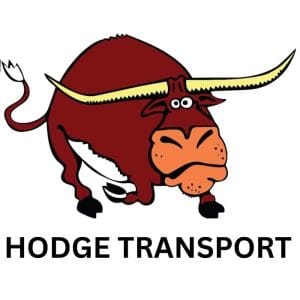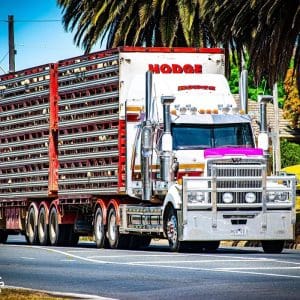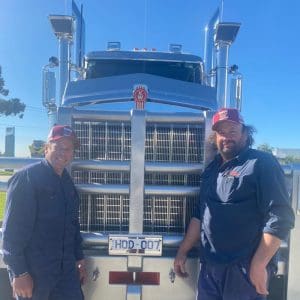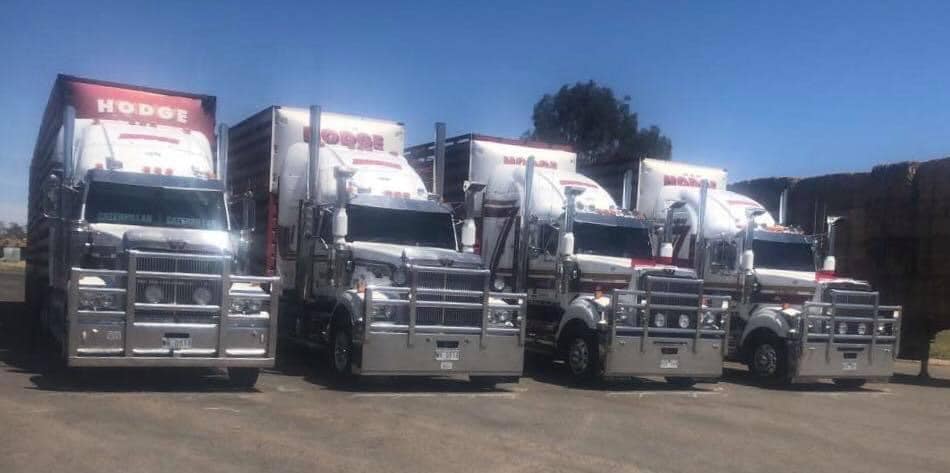
SOLID service has made Hodge Livestock Transport a growing business transporting livestock from Australia’s Apple Isle to mainland processors and across southern Australia.
The third generation Ballan-based business run by brothers Kailey and Rob Hodge has about 50 trailers regularly going back and forth to Tasmania, carting mainly sheep but also cattle, and six B-Doubles working on the mainland.
“We do about 70 percent sheep,” Rob said.
The business currently runs 16 prime movers – mainly Kenworth and Western Star, with one MAN – with 90 percent Byrne stainless steel trailers and with 80pc of the crates able to be converted for sheep and/or cattle.
The company wasn’t in the Top 25 list 10 years ago, but Rob said the business has had strong growth since then, doubling the fleet capacity as the flock and herd has grown.
Rob said a big part of the business’ growth is demand growing out of the limiting transport options open to producers. Hodge Livestock Transport and Page are the only two carriers working the route.
“And that plus a huge part of our work is based around Ballarat and plenty of our lamb clients up in southern New South Wales send their lambs south in the winter time.”
A large part of the work is also servicing the major southern saleyards of Hamilton, Ballarat and Bendigo.
 The largest single client is Coles; shifting lambs – about 200,000 a year — from farms in Tasmanian and across southern Australia to the Australian Lamb Company plant at Colac.
The largest single client is Coles; shifting lambs – about 200,000 a year — from farms in Tasmanian and across southern Australia to the Australian Lamb Company plant at Colac.
“This week we’re doing probably about a dozen trailers off Flinders Island, 20 off King Island and 50-60 out of mainland Tasmania,” Rob said.
The livestock mix from Tasmania and the islands is mainly lambs, sheep and cattle, but also stud goats, pigs and alpacas.
“All sorts of people want to move all sorts of things.”
Loaded Hodge trucks come across on ferries out of Burnie and Devonport and offload in Port Melbourne and from King Island into Tasmania and Port Welshpool in Victoria. Rob is not a supporter of the drive to get truck and freight access to Apollo Bay from King Island. He considers the Apollo Bay port is outdated for this purpose and now revolves around tourism in what would be the peak shipping period out of King Island.
“The road in an out of Apollo Bay is not a B Double-friendly route so currently any stock that we do from King Island comes in at Port Welshpool.
“It’s a much longer trip in sea time but we’ve got facilities there to spell the cattle and sheep and it’s an industrial area with B-double access.”

Kailey Hodge, left, with his brother Rob.
Rob Hodge said a key to retaining business is well-trained and experienced staff that “can do” and maintaining equipment.
“Twenty years ago it was thought ‘that trailer only goes to Tasmania, it doesn’t need to be any good’.
“But the fact of the matter is it doesn’t matter whether the lambs are worth $200 or less, the farmer still wants to see his lambs being put on a decent well-maintained fit-for-purpose vehicle.”
Rob said with the flock declining the sector will be in a holding pattern, with business survival depending on continuing to service clients, maintaining and looking after good staff and crate versatility.
“You’ve got to look after the staff that you’ve got – there are some that want to be at home every night and some that want to be away every night.
“The biggest part of it is the five Ps, (preparation, being professional, positive, patient and proactive) if your prior preparation of livestock is correct there is a very good chance that things going to turn out OK.”
“We’ve seen a lot less, especially in Tassie, of this full less 5pc just jam them on a truck and put them over a weighbridge to curfewing cattle overnight before weighing.”
More lamb consignments now are part of quality assurance programs, but Rob said trying to mix transporting livestock with marketing can be dangerous if prior preparation is not good and there are not convenient weighbridges available.
“We’re seeing a lot more of this weighing of lambs, with store lambs being sold on cents per kilogram.
“We need to be less involved with the marketing and more with delivering the animal in good condition and on his feet.”
Effluent is another challenge, with trucks struggling to meet effluent disposal requirements before navigating tunnels on major routes through Melbourne in a system where there are no disposal sites within 100 km of the Victorian capital, he said.
Livestock carriers are now allowed through the Burnley and Domain tunnels, but Rob said coming from the west Ballarat is the last effluent disposal site, from the north its Kyneton and coming down the Hume it’s at Euroa. From the south-west, the closest effluent disposal sites are at the Hamilton or Colac saleyards.
“Where do you put it?
“It’s OK for us to contain it, but what do we do with it?”
Rob remembers during a LRTAV study tour to New Zealand several years ago effluent was ‘top of mind’ for everyone, but the Kiwis implemented an innovative way to fund solutions.
“They put a dollar on the rate notice of every urban house and $2 on the rural and that made it everybody’s responsibility.”

Rob said other industry challenges were “roads and roads”, driver facilities, respect for truckies from other motorists and on-farm facilities, especially load ramps and yard design.
He said Hodge trucks make 10 trips a week from the Ballarat saleyards to another major lamb and cattle processor, Midfield Meats at Warrnambool, and finding the best roads can add 30-40km to the trip.
Curfew guidelines are also an issue, with Rob noting that the time allowed off feed and water for livestock is the same for stock in Darwin in late January as it is for sheep or cattle coming out of Tasmania in late June, despite the different water requirements of stock at the two departure points.
He said it’s currently a blanket 48 hours off feed and water during transport, but there needs to be changes to the guidelines recognizing the effluent issues for carriers from different departure points to avoid prosecution.

HAVE YOUR SAY